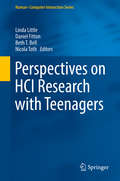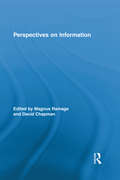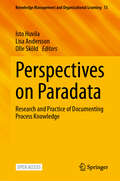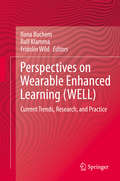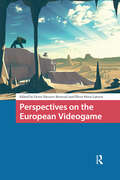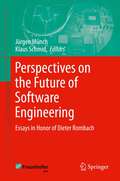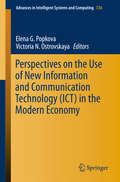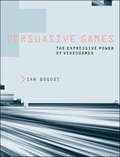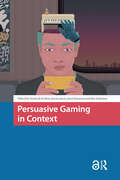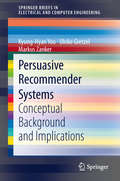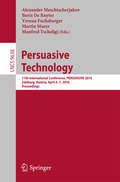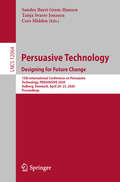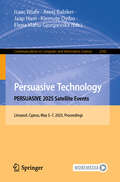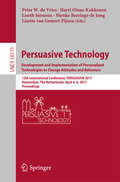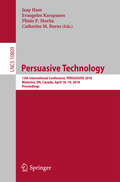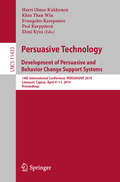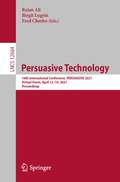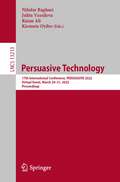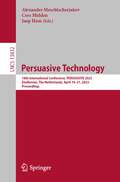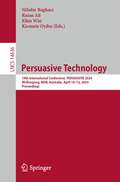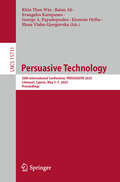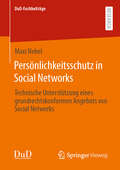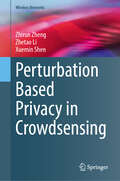- Table View
- List View
Perspectives on HCI Research with Teenagers
by Linda Little Daniel Fitton Beth T. Bell Nicola TothTeen Computer Interaction is concerned with the design, evaluation and implementation of technologies for teenagers and with the study of major phenomena surrounding them. It aims to give special consideration to the unique development issues and diversity of this particular user group. Teenagers are possibly the most diverse, dynamic and technologically-aware user group. Working with teenagers can enable researchers to gather valuable insights and opportunities to inform the design and implementation of new technologies. Researchers have now begun to acknowledge that Teen Computer Interaction is a specialised area of HCI and this book brings together some of the best work in this field to-date. The book provides relevant HCI communities with an inclusive account of methods and examples of best practice to inform those working with teenagers in research and design projects. The chapters recount research with teenagers in many different domains and provide many different contributions to the field of Teen Computer Interaction including design methods, models, case studies and ethical considerations. The aim of this book is to provide a solid foundation from which the discipline of Teen Computer Interaction can grow, by providing a valuable resource for those wishing to conduct HCI research with teenagers. Perspectives on HCI Research with Teenagers is aimed at academics, practitioners, designers, researchers and students who are interested in the new and emergent field of Teen Computer Interaction.
Perspectives on Information (Routledge Studies in Library and Information Science)
by Magnus Ramage David ChapmanInformation is everywhere, and defines everything in today's society. Moreover, information is a key concept in a wide range of academic disciplines, from quantum physics to public policy. However, these disciplines all interpret the concept in quite different ways. This book looks at information in several different academic disciplines - cybernetics, ICT, communications theory, semiotics, information systems, library science, linguistics, quantum physics and public policy. Perspectives on Information brings clarity and coherence to different perspectives through promoting information as a unifying concept across the disciplinary spectrum. Though conceived as a contribution to the ongoing conversation between academic disciplines into the nature of information, the deliberately accessible style of this text (reflecting the authors’ backgrounds at The Open University) will be make it valuable for anyone who needs to know something more about information. Given the ubiquity of information in the 21st century, that means everyone.
Perspectives on Paradata: Research and Practice of Documenting Process Knowledge (Knowledge Management and Organizational Learning #13)
by Isto Huvila Lisa Andersson Olle SköldThis open access book examines a rapidly 'datafied' society, reminding us that it is crucial to know what data is about and where it originates. This insight has led to an embryonic stage of new theorizing, empirical research, and the formation of new technologies, standards, practices, and concepts to ensure the availability of adequate 'paradata' – data on the making and processing of data. This edited volume aims to provide a cross-disciplinary overview of perspectives on the concept and phenomenon of paradata and its implications for research and practice.
Perspectives on Wearable Enhanced Learning (WELL): Current Trends, Research, and Practice
by Fridolin Wild Ralf Klamma Ilona BuchemWearable technologies – such as smart glasses, smart watches, smart objects, or smart garments – are potential game-changers, breaking ground and offering new opportunities for learning. These devices are body-worn, equipped with sensors, and integrate ergonomically into everyday activities. With wearable technologies forging new human-computer relations, it is essential to look beyond the current perspective of how technologies may be used to enhance learning. This edited volume,“Perspectives on Wearable Enhanced Learning,” aims to take a multidisciplinary view on wearable enhanced learning and provide a comprehensive overview of current trends, research, and practice in diverse learning contexts including school and work-based learning, higher education, professional development, vocational training, health and healthy aging programs, smart and open learning, and work. This volume features current state of the art wearable enhanced learning and explores how these technologies have begun to mark the transition from the desktop through the mobile to the age of wearable, ubiquitous technology-enhanced learning.
Perspectives on the European Videogame (Games and Play)
by Víctor Navarro-Remesal Óliver Pérez-LatorreThe history of European videogames has so far been overshadowed by the global impact of the Japanese and North American industries. However, European game development studios have played a major role in videogame history, and many prominent videogames in popular culture, such as Grand Theft Auto, Tomb Raider, Alone in the Dark, and The Witcher, were made in Europe. This book proposes an inquiry into European videogames, including both analyses of transnational aspects of European production and close readings of national specificities. It offers a kaleidoscope of European videogame culture, focusing on the analysis of European works and creators but also addressing contextual aspects and placing videogames within a wider sociocultural and philosophical ground. The aim of this collective work is to contribute to the creation of a, until now, almost non-existent yet necessary academic endeavour: a story and critical exploration of the works, authors, styles, and cultures of the European videogame.
Perspectives on the Future of Software Engineering
by Jürgen Münch Klaus SchmidThe dependence on quality software in all areas of life is what makes software engineering a key discipline for today's society. Thus, over the last few decades it has been increasingly recognized that it is particularly important to demonstrate the value of software engineering methods in real-world environments, a task which is the focus of empirical software engineering. One of the leading protagonists of this discipline worldwide is Prof. Dr. Dr. h.c. Dieter Rombach, who dedicated his entire career to empirical software engineering. For his many important contributions to the field he has received numerous awards and recognitions, including the U.S. National Science Foundation's Presidential Young Investigator Award and the Cross of the Order of Merit of the Federal Republic of Germany. He is a Fellow of both the ACM and the IEEE Computer Society. This book, published in honor of his 60th birthday, is dedicated to Dieter Rombach and his contributions to software engineering in general, as well as to empirical software engineering in particular. This book presents invited contributions from a number of the most internationally renowned software engineering researchers like Victor Basili, Barry Boehm, Manfred Broy, Carlo Ghezzi, Michael Jackson, Leon Osterweil, and, of course, by Dieter Rombach himself. Several key experts from the Fraunhofer IESE, the institute founded and led by Dieter Rombach, also contributed to the book. The contributions summarize some of the most important trends in software engineering today and outline a vision for the future of the field. The book is structured into three main parts. The first part focuses on the classical foundations of software engineering, such as notations, architecture, and processes, while the second addresses empirical software engineering in particular as the core field of Dieter Rombach's contributions. Finally, the third part discusses a broad vision for the future of software engineering.
Perspectives on the Use of New Information and Communication Technology (Advances in Intelligent Systems and Computing #726)
by Elena G. Popkova Victoria N. OstrovskayaThis book includes the best works presented at the scientific and practical conference that took place on February 1, 2018 in Pyatigorsk, Russia on the topic “Perspectives on the use of New Information and Communication Technology (ICT) in the Modern Economy”. The conference was organized by the Institute of Scientific Communications (Volgograd, Russia), the Center for Marketing Initiatives (Stavropol, Russia), and Pyatigorsk State University (Pyatigorsk, Russia).The book present the results of research on the complex new information and communication technologies in the modern economy and law as well as research that explore limits of and opportunities for their usage. The target audience of this book includes undergraduates and postgraduates, university lecturers, experts, and researchers studying various issues concerning the use of new information and communication technologies in modern economies. The book includes research on the following current topics in modern economic science: new challenges and opportunities for establishing information economies under the influence of scientific and technical advances, digital economy as a new vector of development of the modern global economy, economic and legal aspects of using new information and communication technologies in developed and developing countries, priorities of using the new information and communication technologies in modern economies, platforms of communication integration in tourism using new information and communication technologies, and economic and legal managerial aspects and peculiarities of scientific research on the information society.
Persuasive Games
by Ian BogostVideogames are an expressive medium, and a persuasive medium; they represent how real and imagined systems work, and they invite players to interact with those systems and form judgments about them. In this innovative analysis, Ian Bogost examines the way videogames mount arguments and influence players. Drawing on the 2,500-year history of rhetoric, the study of persuasive expression, Bogost analyzes rhetoric's unique function in software in general and videogames in particular. The field of media studies already analyzes visual rhetoric, the art of using imagery and visual representation persuasively. Bogost argues that videogames, thanks to their basic representational mode of procedurality (rule-based representations and interactions), open a new domain for persuasion; they realize a new form of rhetoric. Bogost calls this new form "procedural rhetoric," a type of rhetoric tied to the core affordances of computers: running processes and executing rule-based symbolic manipulation. He argues further that videogames have a unique persuasive power that goes beyond other forms of computational persuasion. Not only can videogames support existing social and cultural positions, but they can also disrupt and change these positions themselves, leading to potentially significant long-term social change. Bogost looks at three areas in which videogame persuasion has already taken form and shows considerable potential: politics, advertising, and learning. Bogost is both an academic researcher and videogame designer, and Persuasive Games reflects both theoretical and a game design goals.
Persuasive Games: The Expressive Power of Videogames
by Ian BogostAn exploration of the way videogames mount arguments and make expressive statements about the world that analyzes their unique persuasive power in terms of their computational properties. Videogames are an expressive medium, and a persuasive medium; they represent how real and imagined systems work, and they invite players to interact with those systems and form judgments about them. In this innovative analysis, Ian Bogost examines the way videogames mount arguments and influence players. Drawing on the 2,500-year history of rhetoric, the study of persuasive expression, Bogost analyzes rhetoric's unique function in software in general and videogames in particular. The field of media studies already analyzes visual rhetoric, the art of using imagery and visual representation persuasively. Bogost argues that videogames, thanks to their basic representational mode of procedurality (rule-based representations and interactions), open a new domain for persuasion; they realize a new form of rhetoric. Bogost calls this new form "procedural rhetoric," a type of rhetoric tied to the core affordances of computers: running processes and executing rule-based symbolic manipulation. He argues further that videogames have a unique persuasive power that goes beyond other forms of computational persuasion. Not only can videogames support existing social and cultural positions, but they can also disrupt and change these positions themselves, leading to potentially significant long-term social change. Bogost looks at three areas in which videogame persuasion has already taken form and shows considerable potential: politics, advertising, and learning.
Persuasive Gaming in Context (Games and Play)
by Ben Schouten Joost Raessens Teresa de la Hera Jeroen JanszThe rapid developments in new communication technologies have facilitated the popularization of digital games, which has translated into an exponential growth of the game industry in recent decades. The ubiquitous presence of digital games has resulted in an expansion of the applications of these games from mere entertainment purposes to a great variety of serious purposes. In this edited volume, we narrow the scope of attention by focusing on what game theorist Ian Bogost has called 'persuasive games', that is, gaming practices that combine the dissemination of information with attempts to engage players in particular attitudes and behaviors. This volume offers a multifaceted reflection on persuasive gaming, that is, on the process of these particular games being played by players. The purpose is to better understand when and how digital games can be used for persuasion by further exploring persuasive games and some other kinds of persuasive playful interaction as well. The book critically integrates what has been accomplished in separate research traditions to offer a multidisciplinary approach to understanding persuasive gaming that is closely linked to developments in the industry by including the exploration of relevant case studies.
Persuasive Recommender Systems
by Ulrike Gretzel Kyung-Hyan Yoo Markus ZankerWhether users are likely to accept the recommendations provided by a recommender system is of utmost importance to system designers and the marketers who implement them. By conceptualizing the advice seeking and giving relationship as a fundamentally social process, important avenues for understanding the persuasiveness of recommender systems open up. Specifically, research regarding influential factors in advice seeking relationships, which is abundant in the context of human-human relationships, can provide an important framework for identifying potential influence factors in recommender system context. This book reviews the existing literature on the factors in advice seeking relationships in the context of human-human, human-computer, and human-recommender system interactions. It concludes that many social cues that have been identified as influential in other contexts have yet to be implemented and tested with respect to recommender systems. Implications for recommender system research and design are discussed.
Persuasive Technology
by Alexander Meschtscherjakov Boris De Ruyter Verena Fuchsberger Martin Murer Manfred TscheligiThis book constitutes therefereed proceedings of the 11th International Conference on PersuasiveTechnology, PERSUASIVE 2016, held in Salzburg, Austria, in April 2016. The 27 revised full papers and 3 revised short papers presented were carefullyreviewed and selected from 73 submissions. The papers are grouped in topicalsections on individual differences, theoretical reflections, prevention andmotivation, methods and models, games and gamification, interventions forbehavior change, and design strategies and techniques.
Persuasive Technology. Designing for Future Change: 15th International Conference on Persuasive Technology, PERSUASIVE 2020, Aalborg, Denmark, April 20–23, 2020, Proceedings (Lecture Notes in Computer Science #12064)
by Sandra Burri Gram-Hansen Tanja Svarre Jonasen Cees MiddenThis book constitutes the refereed proceedings of the 15th International Conference on Persuasive Technology, PERSUASIVE 2020, held in Aalborg, Denmark, in April 2020. The 18 full papers presented in this book were carefully reviewed and selected from 79 submissions. The papers are grouped in the following topical sections: methodological and theoretical perspectives on persuasive design; persuasive in practice, digital insights; persuasive technologies for health and wellbeing; persuasive solutions for a sustainable future; and on security and ethics in persuasive technology.
Persuasive Technology. PERSUASIVE 2025 Satellite Events: Limassol, Cyprus, May 5–7, 2025, Proceedings (Communications in Computer and Information Science #2542)
by Jaap Ham Kiemute Oyibo Elena Vlahu-Gjorgievska Isaac Wiafe Areej BabikerThis book constitutes the proceedings of the PERSUASIVE 2025 Satellite Events, held together with the 20th International Conference on Persuasive Technology, in Limassol, Cyprus, during May 5–7, 2025.The 10 full papers and 5 short papers included in this book were carefully reviewed and selected from 19 submissions. They are organized in topical sections as follows: Late Breaking Results; Poster Presentations; Demonstrations and Artefacts and Doctoral Consortium Papers.
Persuasive Technology: 12th International Conference, PERSUASIVE 2017, Amsterdam, The Netherlands, April 4–6, 2017, Proceedings (Lecture Notes in Computer Science #10171)
by Peter W. de Vries, Harri Oinas-Kukkonen, Liseth Siemons, Nienke Beerlage-de Jong and Lisette van Gemert-PijnenThis book constitutes the refereed proceedings of the 12th International Conference on Persuasive Technology, PERSUASIVE 2017, held in Amsterdam, The Netherlands, in April 2017. The 23 revised full papers presented were carefully reviewed and selected from 85 submissions. The papers are grouped in topical sections on health(care), monitoring, and coaching; personality, personalization, and persuasion; motivations, facilitators, and barriers; design principles and strategies.
Persuasive Technology: 13th International Conference, Persuasive 2018, Waterloo, On, Canada, April 18-19, 2018, Proceedings (Lecture Notes in Computer Science #10809)
by Jaap Ham Evangelos Karapanos Plinio P. Morita Catherine M. BurnsThis book constitutes the refereed proceedings of the 13th International Conference on Persuasive Technology, PERSUASIVE 2018, held in Waterloo, ON, Canada, in April 2018. The 21 revised full papers and 4 short papers presented were carefully reviewed and selected from 59 submissions. The papers demonstrate how persuasive technologies can help solve societal issues. They explore new frontiers for persuasive technology, such as personalized persuasion, new sensor usage, uses of big data, and new ways of creating engagement through gaming or social connection, focusing on a variety of technologies (e.g., web, wearables, AI, and smart environments). The papers are organized in the following topical sections: social means to persuasion; nudging and just-in-time interventions; design principles and practices; persuasive games; personalization and tailoring; and theoretical reflections.
Persuasive Technology: 14th International Conference, PERSUASIVE 2019, Limassol, Cyprus, April 9–11, 2019, Proceedings (Lecture Notes in Computer Science #11433)
by Harri Oinas-Kukkonen Evangelos Karapanos Khin Than Win Pasi Karppinen Eleni KyzaThis book constitutes the refereed proceedings of the 14th International Conference on Persuasive Technology, PERSUASIVE 2019, held in Limassol, Cyprus, in April 2019. The 29 full papers presented were carefully reviewed and selected from 79 submissions. The papers demonstrate how persuasive technologies can help solve societal issues. They were subsequently grouped in the following topical sections: Terminologies and methodologies; self-monitoring and reflection; systems development process; drones and automotives; ethical and legal aspects; special application domains; motivation and goal setting; personality, age and gender; social support; user types and tailoring.
Persuasive Technology: 16th International Conference, PERSUASIVE 2021, Virtual Event, April 12–14, 2021, Proceedings (Lecture Notes in Computer Science #12684)
by Fred Charles Raian Ali Birgit LugrinThis book constitutes the refereed post-conference proceedings of the 16th International Conference on Persuasive Technology, PERSUASIVE 2021, held as a virtual event, in April 2021. The 17 full papers presented in this book together with 8 short papers were carefully reviewed and selected from 67 submissions. The papers are grouped in topical sections as follows: persuasive affective technology; digital marketing, ecommerce, etourism and smart ecosystems; and persuasion and education.
Persuasive Technology: 17th International Conference, PERSUASIVE 2022, Virtual Event, March 29–31, 2022, Proceedings (Lecture Notes in Computer Science #13213)
by Julita Vassileva Raian Ali Nilufar Baghaei Kiemute OyiboThis book constitutes the refereed post-conference proceedings of the 17th International Conference on Persuasive Technology, PERSUASIVE 2022, held as a virtual event, in March 2022. The 13 full papers presented in this book together with 7 short papers were carefully reviewed and selected from 46 submissions.
Persuasive Technology: 18th International Conference, PERSUASIVE 2023, Eindhoven, The Netherlands, April 19–21, 2023, Proceedings (Lecture Notes in Computer Science #13832)
by Alexander Meschtscherjakov Jaap Ham Cees MiddenThis book constitutes the refereed proceedings of the 18th International Conference on Persuasive Technology, PERSUASIVE 2023, held in Eindhoven, The Netherlands, April 19–21, 2023.The 24 full papers and 2 short papers included in this book were carefully reviewed and selected from 69 submissions. They were organized in topical sections as follows: Persuasive Technologies in Virtual and Augmented Reality; Persuasive Strategies; Persuasive Design and Applications; Methods for Tailoring and Personalisation; Artificial Persuasive Agents; Gamification; and Personal Factors in Persuasion.
Persuasive Technology: 19th International Conference, PERSUASIVE 2024, Wollongong, NSW, Australia, April 10–12, 2024, Proceedings (Lecture Notes in Computer Science #14636)
by Raian Ali Nilufar Baghaei Kiemute Oyibo Khin WinThis book constitutes the refereed post-conference proceedings the 19th International Conference on Persuasive Technology, PERSUASIVE 2024 held in Wollongong, NSW, Australia, during April 10–12, 2024. The 14 revised full papers and 8 short papers presented in this book were carefully reviewed and selected from 51 submissions. based on their content: methods for tailoring and personalization; persuasive design and applications, persuasive strategies; and persuasive technologies and ethics.
Persuasive Technology: 20th International Conference, PERSUASIVE 2025, Limassol, Cyprus, May 5-7, 2025, Proceedings (Lecture Notes in Computer Science #15711)
by George A. Papadopoulos Evangelos Karapanos Khin Than Win Raian Ali Kiemute Oyibo Elena Vlahu-GjorgievskaThis book constitutes the refereed proceedings of the 20th International Conference on Persuasive Technology, PERSUASIVE 2025, held in Limassol, Cyprus, during May 5–7, 2025. The 17 full papers and 6 short papers included in this book were carefully reviewed and selected from 49 submissions. They are organized in topical sections as follows: Personalized Persuasion; Theory and Exploration; Design and Solutions; Emotions and Behaviour; Behavior Change Games; Personality and Individual Differences.
Persuasive Technology: Development and Implementation of Personalized Technologies to Change Attitudes and Behaviors
by Harri Oinas-Kukkonen Peter W. de Vries Liseth Siemons Nienke Beerlage-de Jong Lisette van Gemert-PijnenThis book constitutes the refereed proceedings of the 12th International Conference on Persuasive Technology, PERSUASIVE 2017, held in Amsterdam, The Netherlands, in April 2017. The 23 revised full papers presented were carefully reviewed and selected from 85 submissions. The papers are grouped in topical sections on health(care), monitoring, and coaching; personality, personalization, and persuasion; motivations, facilitators, and barriers; design principles and strategies.
Persönlichkeitsschutz in Social Networks: Technische Unterstützung eines grundrechtskonformen Angebots von Social Networks (DuD-Fachbeiträge)
by Maxi NebelDieses Buch befasst sich mit dem Schutz der Persönlichkeitsrechte der Nutzer von Social Networks. Es werden die Vorgaben der Datenschutz-Grundverordnung dezidiert auf Social Networks angewendet. Diese haben auf unionsrechtlicher Ebene mit dem Wirksamwerden der Datenschutz-Grundverordnung wichtige Veränderungen erfahren. Besondere Beachtung findet dabei die Verteilung der Verantwortlichkeit auf Anbieter und Nutzer, die durch die komplexen Datenverarbeitungsvorgänge in Social Networks in der Praxis sehr vielschichtig sind. Außerdem werden mithilfe der interdisziplinären Methode KORA aus verfassungsrechtlichen Vorgaben und Anforderungen rechtliche Kriterien identifiziert und organisatorische und technische Gestaltungsziele entwickelt, um eine rechtsverträgliche Systemgestaltung von Social Networks anzustoßen.Maxi Nebel ist wissenschaftliche Mitarbeiterin in der Projektgruppe verfassungsverträgliche Technikgestaltung (provet) unter der Leitung von Prof. Dr. Alexander Roßnagel am Wissenschaftlichen Zentrum für Informationstechnik-Gestaltung (ITeG) an der Universität Kassel. Sie ist Mitglied im Forum Privatheit.
Perturbation Based Privacy in Crowdsensing (Wireless Networks)
by Xuemin Shen Zhirun Zheng Zhetao LiThis book investigates perturbation-based privacy in crowdsensing systems. The authors first present an explicit overview of crowdsensing systems and privacy challenges and briefly discuss how the noise added by perturbation-based privacy-preserving techniques could inevitably degrade data quality and facilitate the success of data poisoning attacks on crowdsensing. The authors then give a comprehensive review of classical privacy notions for perturbation-based privacy-preserving techniques and theoretically analyze the relations between these privacy notions. The next four chapters conduct a series of studies on privacy preservation in crowdsensing systems from three dimensions of data privacy, data utility and data poisoning. Finally, the book explores open issues and outlines future research directions for perturbation-based privacy preservation in crowdsensing systems. Advanced-level students majoring in the areas of network security, computer science and electrical engineering will find this book useful as a secondary text. Professionals seeking privacy-preserving solutions for crowdsensing systems will also find this book useful as a reference.
